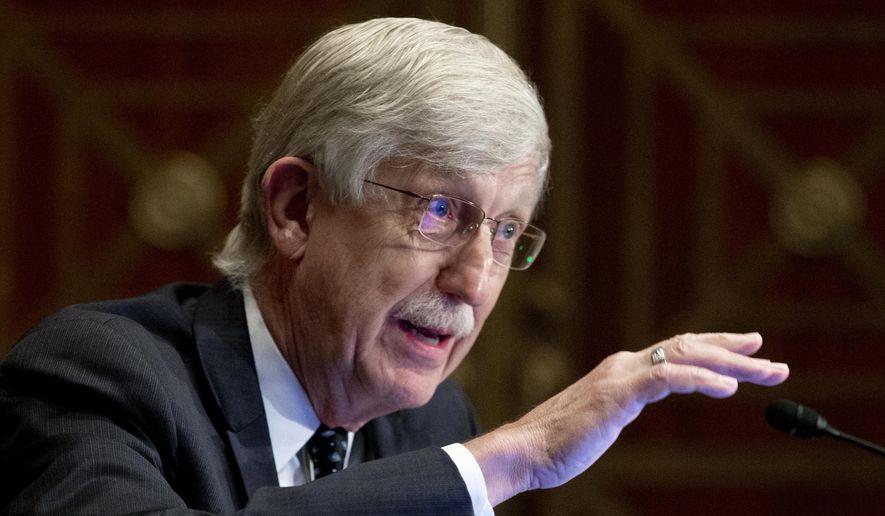Dr. Francis Collins announced Tuesday he will step down as director of the National Institutes of Health by the end of the year because it is time for a “new scientist” to lead the biomedical agency after his 12-year run.
Dr. Collins, who led an effort to map the human genome before rising in visibility during the coronavirus pandemic, will return to his lab at the National Human Genome Research Institute.
“I love this agency and its people so deeply that the decision to step down was a difficult one, done in close counsel with my wife, Diane Baker, and my family,” Dr. Collins said. “I am proud of all we’ve accomplished. I fundamentally believe, however, that no single person should serve in the position too long, and that it’s time to bring in a new scientist to lead the NIH into the future.”
Dr. Collins, 71, led NIH through the Obama and Trump administrations. He is Dr. Anthony Fauci’s boss.
The director told The Washington Post he went on a retreat in May and decided to step down this year instead of getting too deep into the current administration.
He also felt the development of therapeutics and vaccines for COVID-19 was in a “stable place” after a flurry of activity last year, including an NIH partnership with Moderna, maker of one of the leading vaccines to fight the deadly pandemic.
President Biden, who will have to nominate a replacement, called Dr. Collins “one of the most important scientists of our time.”
Mr. Biden said he leaned on Dr. Collins multiple times, notably during the launch of his cancer-fighting “moonshot” program as vice president after the death of his son, Beau.
“I turned to Dr. Collins to help lead the effort to end cancer as we know it. There was no one I trusted more,” Mr. Biden said. “Dr. Collins was asked to continue to lead the NIH by President Trump and was central in the NIH’s unprecedented efforts to develop the COVID-19 vaccine. After I was elected president, Dr. Collins was one of the first people I asked to stay in his role with the nation facing one of the worst public health crises in our history.”
Some Republicans have pressed Dr. Collins to be more forthcoming about U.S. grant funding for a viral lab in Wuhan, China, to determine whether it contributed to “gain-of-function” research that makes viruses more dangerous to humans.
The coronavirus was first identified in the same central Chinese city, raising questions about whether a lab leak sparked the virus outbreak as opposed to natural transmission from an animal host to humans.
Yet Dr. Collins enjoyed broad support from prominent GOP lawmakers on key health and appropriations panels. NIH’s budget has risen during his tenure, from $30 billion to $41.3 billion, due to vocal support from Congress for research into new cures and discoveries.
“Dr. Collins is the only presidentially appointed NIH director to serve more than one administration — a testament to the confidence and respect he garnered on both sides of the aisle,” Sen. Roy Blunt, Missouri Republican, said. “As chairman and the top Republican on the health appropriations subcommittee, I have always appreciated how effectively Dr. Collins has worked with the Congress to help us achieve a pattern of substantial, historic federal increases in NIH funding.”
A physician-geneticist, Dr. Collins served as director of the National Human Genome Research Institute (NHGRI) from 1993 to 2008, where he led the international Human Genome Project to map human DNA.
The effort contributed to the development of “precision medicine” to tailor treatments “to every person’s unique genetics, environment and lifestyle,” according to NIH.
During the pandemic, his agency played a key role in assisting the rapid development of vaccines and therapeutics by private drugmakers under President Trump’s Operation Warp Speed.
The NIH also set up a federal grant system, the Rapid Acceleration of Diagnostic (RADx) program, to speed the development of virus-testing technologies.
“Few people could come anywhere close to achieving in a lifetime what Dr. Collins has at the helm of NIH,” said Health and Human Services Secretary Xavier Becerra. “It takes an extraordinary person to tackle the biggest scientific challenges facing our nation — and under three presidents, amidst three distinctly different chapters of American history.”
• Tom Howell Jr. can be reached at thowell@washingtontimes.com.




Please read our comment policy before commenting.